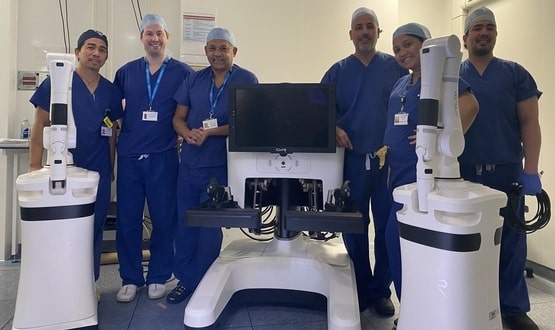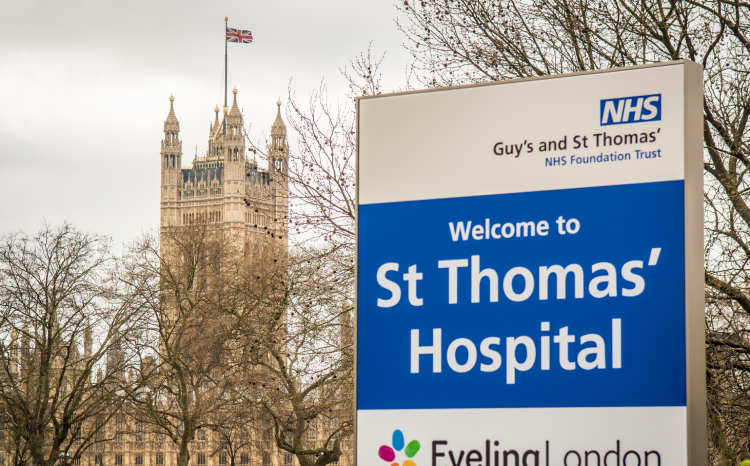Guy’s and St Thomas’ first to use TORS approach for surgery
- 23 March 2023

A team from Guy’s and St Thomas’ NHS Foundation Trust have become the first in the world to use the Versius robotic surgery system to operate through a patient’s mouth.
Operating through the mouth – known as transoral robotic surgery (TORS) – is a less invasive approach, and can help speed up the patient’s recovery. While the technique is already well established this is the first time it has been performed with this newer surgical robot.
In December 2021, Guy’s and St Thomas’ became the first site in London to adopt CMR Surgical’s Versius surgical robot. It now has the largest robotic surgery programme in the UK, with six robots operating across six specialities: urology, thoracic, head and neck, gynaecology, transplant and gastrointestinal.
Its use for TORS is part of a research study between the trust and King’s College London.
In the UK, the approach was pioneered by Guy’s and St Thomas’ robotic head and neck surgery lead Mr Asit Arora.
He said: “Going through the mouth with a robotic system allows surgeons to safely operate in a tight, small space which is surrounded by important blood vessels and nerves.
“The Versius robot uses miniaturised surgical instruments that are perfect in such a small operating space. In addition to the enhanced 3D view, Versius allows the surgeon to make relatively big movements on the console that can be scaled down to allow precise, small movements in the operative space.
“Before TORS, we would have had to have done bigger, more invasive operations with a much longer recovery time for our patients.”
The minimally invasive TORS approach can mean that some patients need smaller doses of further treatments like radiotherapy or chemotherapy, while others may be able to avoid additional treatments completely.
Mark Slack, chief medical officer at CMR Surgical, said: “Through this research project, we hope to be able to develop the use of Versius for TORS surgery in the future, so that tongue and throat cancers can be operated on in a minimally invasive way, with improved outcomes for patients.”
To date, 10 patients have been treated with Versius using TORS.
Versius to help with thoracic surgery
In a second UK debut for the Versius robots, thoracic surgeons at the Royal Papworth Hospital in Cambridge will start using the technology to help overcome the challenges posed by operating with a minimally invasive approach in the lungs, thymus, and oesophagus. Through small incisions between the patients’ ribs, thoracic surgeons can work precisely and accurately in the chest cavity with Versius, benefitting from its small, fully wristed instruments and 3D HD vision.
Mr Adam Peryt, Consultant Thoracic Surgeon at Royal Papworth said: “Thoracic surgeons have long been waiting for a surgical robot like Versius that is suited to our specific needs. Of course, we want all the benefits you’d expect of robotic-assisted surgery, but we also needed a system that allows us to continue using small instruments and ports that we can place exactly where is needed given the limitations of operating through the ribcage. Versius gives us this.”
The first cases with Versius at Royal Papworth are due to start in spring 2023, following the completion of a comprehensive training programme by the surgeons and surgical team





